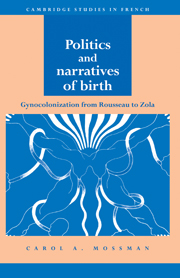Book contents
- Frontmatter
- Contents
- Acknowledgements
- A note on translations
- Introduction: conception of this book
- Cycle 1 Stendhal: delivering a plot
- Cycle 2 Production, reproductions, and narrative form: Adolphe
- Cycle 3 Gynocolonization: Rousseau, Michelet, Zola and the nineteenth-century French novel
- Conclusion
- Notes
- Bibliography
- Index
- CAMBRIDGE STUDIES IN FRENCH
Introduction: conception of this book
Published online by Cambridge University Press: 22 September 2009
- Frontmatter
- Contents
- Acknowledgements
- A note on translations
- Introduction: conception of this book
- Cycle 1 Stendhal: delivering a plot
- Cycle 2 Production, reproductions, and narrative form: Adolphe
- Cycle 3 Gynocolonization: Rousseau, Michelet, Zola and the nineteenth-century French novel
- Conclusion
- Notes
- Bibliography
- Index
- CAMBRIDGE STUDIES IN FRENCH
Summary
How to begin a study of birth? Merely to mention birth summons up branches of knowledge as diverse as medical science and bio-ethics, psychology, theology, anthropology, political science, and aesthetics, to name only a few. For birth cannot be contemplated in isolation: to speak of birth is to open up to the problematics of origins. And culture has a stake in addressing origins. This much is evident from the universal existence of myths and cosmogonies which recount genesis. To the extent that such accounts also seek to situate human existence within the larger scheme of things, narratives of collective origins must intertwine with what it means for the individual body to emerge into the world.
If giving birth is never an isolated act, to be born is to emerge into a social environment. We are all born into culture. We are all born … and yet only half of us are actually capable of giving birth. That one fundamental biological fact carries with it an ideological burden almost beyond conception. We are all born into discourses bearing on reproduction, kinship and family, species propagation for or against the State, creation and procreation. There is thus no neutral passageway leading to birth.
In attempting once again, then, to begin, I cannot help but invoke Sterne's Tristram Shandy, which stages all the ironies of beginning with birth as the postpartum narrator gazes backward through time's speculum on his own mise-au-monde.
- Type
- Chapter
- Information
- Politics and Narratives of BirthGynocolonization from Rousseau to Zola, pp. 1 - 18Publisher: Cambridge University PressPrint publication year: 1993



